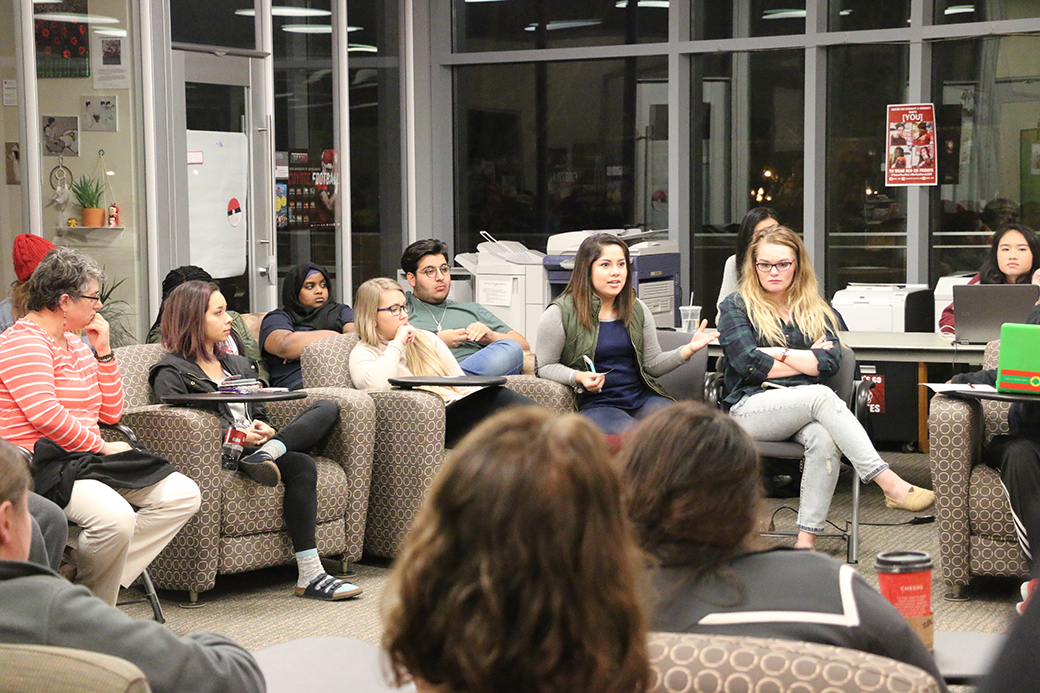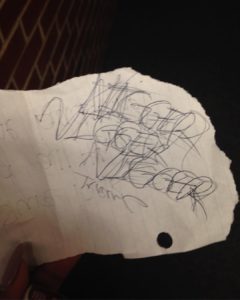
Students, faculty voice concerns after presidential election
With four words crudely scrawled on a piece of paper and shoved under her door last Thursday, first-year Valerie Sunderland’s fears about what a future Donald Trump presidency might entail for her as a black student became a reality.
“At that moment, you know, I had never felt more unsafe being who I am in my life,” Sunderland said. “I’ve lived in South Dakota for over half my life and out of everything I’ve endured in my life in that moment I knew that I could not be safe being the person that I am.”
Sunderland immediately took the note, which read “Nigger, nigger, nigger, Trump,” to USD Housing officials and also filed a report with the University Police Department. She also posted a photo of the note on social media, where it’s been shared hundreds of times.

“I posted it to Facebook, I posted it to Twitter, I posted it to Instagram because I know that there are other students on campus who are going through the same situations, just like me, who are scared to come forward,” she said.
Kim Grieve, the dean of students at USD, said an investigation is underway into who might have slipped the note under the door.
Sunderland blames the note on the election of Trump last week. She said she doesn’t believe all those who supported the President-elect are racists, sexists, xenophobes or homophobes, but that the rhetoric Trump used during his campaign has emboldened racists and white supremacists to act on their biases.
“The things that he said to get to where he is now put people in the position that they feel empowered to be racists, be sexists, just express that freely like it’s not going to have any affect on people and like Trump is going to give them some gold star or something like, ‘good for you, you were racist today,’” she said.
Senior Shamly Mackey, president of the Muslim Student Association, watched the election results roll in last Tuesday night with his roommate. They went to bed shortly after midnight, just in time to see that Trump was winning. When Mackey woke up and Googled the final results, he thought he was dreaming.
Shortly afterward, he got calls from his sister, father and grandfather who live in Sri Lanka, where Mackey is from, to make sure he was okay.
“Since I came to the U.S., maybe the first time I came, I was a little bit scared, skeptical, not very sure how people would look at me. But everyone was very welcoming, open arms. And I guess that morning (after the election) was the first morning while I was going to class … (that’s the) first time in my life I really felt that scared,” he said. “For me, it was just scary that, not exactly that Trump won, but that people endorse his ideas and are okay with those ideas. I guess that’s what surprised me the most.”
Though Mackey hasn’t experienced any discrimination since the election results were announced, he’s heard of several instances occurring around campus. In addition to the note Sunderland received, he’s heard of an international student being yelled at and an incident in which a Muslim student’s hijab was pulled by other students on campus. The Volante wasn’t able to confirm these stories with university officials.
“It’s very unfortunate, these kind of things happening,” Mackey said. “I guess the most scary thing is that it’s happening on USD.”
Violence or harassment from anyone is uncalled for, said Jordan Hanson, a member of the USD College Republicans who voted for Trump.
“I’m really disappointed in the Trump supporters that are being violent, just because I think it’s the wrong way to support your candidate and I think it’s just a justification of being hateful,” she said.
Hanson said she’s been called names on social media for supporting Trump and said she believes blanket statements shouldn’t be made about any group of people.
“I wouldn’t claim myself to be a bigot, racist or supremacist like any of the names I’ve been called on social media and I think it really just comes down to I’m a Trump supporter,” she said. “The people who claim to be Trump supporters and act that way don’t get a clean slate just because they’re Trump supporters.”
Thursday afternoon, a little less than an hour before Sunderland would find the note in her room, USD students across campus received an email from Grieve and Lamont Sellers, the associate vice president for diversity at USD, addressing the election and the “many emotions across our nation and here in our community.”
“We remain committed to the work of social justice education, cultural competence, and awareness at USD,” they said. “We understand that change can be difficult. However, as a community we remain committed to ensuring the safety and well-being of all.”
Grieve said the email was meant to remind everyone who attends USD or works on campus about the university’s values. She also said she heard of another incident that happened on campus, but didn’t go into further details on it.
“There’s been things that are happening around the country on university campuses and we just wanted to make sure that everybody at USD — we have freedom of speech, but we always hope to be inclusively excellent,” she said.
Since the election of Trump last Tuesday, thousands of people have taken to the streets in cities across the country to protest him and his rhetoric. Some of the protests have turned violent, with one person tackling an anti-Trump speaker at Ohio State University yesterday.
On the day after the election, USD President James Abbott called for unity and said the nation needs to come together to respect the electoral process.
“Hopefully we won’t see some of the behavior that I think he, upon occasion, encouraged during the campaign. So I think we’ll just have to wait and see,” he said.
The differences between Trump the president and Trump the candidate might be surprising, Hanson said. She also said she didn’t want to discredit the fears that students on campus might have of his impending presidency.
“There’s no way I could ever tell someone else how they’re allowed to feel or how someone else’s words made them feel,” she said. “I think a lot of what will happen in the future will determine whether or not they should still feel that way and even I am waiting to see how this is going to all play out. I think we’re going to have to start looking to how his actions are now as president rather than how he was a candidate.”
In an interview with CBS’ Lesley Stahl on “60 Minutes” Sunday night, Trump called for the nation to unify and said he didn’t know about the numerous incidents of racism that had taken place in his name since election night.
“I am so saddened to hear that and I say ‘stop it’ if it helps. I will say this and I will say it right to the cameras: ‘Stop it,’” he said.
Sellers the election has made him resolute in what he’s doing.
“Honestly it just strengthens my resolve that the work that I do is even more needed. I think a lot of that type of rhetoric — a lot of that noise — comes from a place of ignorance,” he said. “I look at that, I hear that and I realize there’s a lot more knowledge that needs to happen and that people need to get so I won’t stop talking, I won’t stop educating.”
Sellers said the Center for Diversity & Community held meetings last Wednesday for students to come and speak about their feelings about the results of the election. He said some minority students hadn’t left their dorm rooms that day and others were frightened at what might happen to them.
“It really struck me listening to the students last night at the fear that many of them have,” he said. “Some of our students fear for their parents that might be deported, for our international students that really don’t understand what is going on and what has happened and really almost they’re questioning whether they want to still be in this place that they thought was the America they wanted to learn and grow and be a part of for their educational experience.”
On Tuesday afternoon, professors from the USD Criminal Justice Program handed out safety pins to students. The safety pin, in the past week, has become a symbol that a person wearing it is a “safe space” or “ally.”
“We’re passing out safety pins as a show of unity across campus to show there’s room for everyone’s ideas and everyone’s opinions and that we should be united as Yotes regardless of what your personal beliefs or political beliefs are,” said Bridget Diamond-Welch, an assistant professor of criminal justice. “We should support everyone and be a community as a whole.”
Welch said the group had heard of instances of negative things happening to students across campus and they want people to stand up for those students, regardless of who they voted for.
A bystander intervention training session will also be held Dec. 1 at 8 p.m. in MUC 211/211A.
Sunderland said that even though she feels scared to be on campus for the first time since starting college, she knows there’s students and professors who are supportive of her.
“Although I feel threatened by some of the students here on campus I know that there are a lot of USD community members that are there to like have my back and give me support and I’m not alone in this,” she said.
News presentation editor Ally Krupinsky contributed to this report

